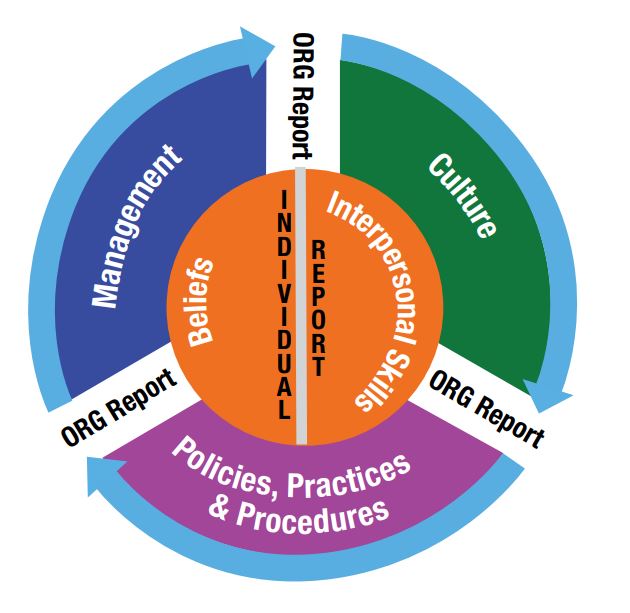Why should you become an inclusive leader? People want to be a part of an…

Small Business Sea Change?
Are Small Businesses Embracing Diversity & Inclusion?
We are in the midst of a sea change: corporations are coming to recognize not only the moral imperative, but also the compelling business case for racial equity. But what about small businesses? In a country where massive companies dominate, should small businesses also tackle this fight?
The Business Case Summarized
There is overwhelming evidence that diversity and inclusion are business necessities, from recruitment and retention to supporting the bottom line. Further, employees want to be part of diverse organizations and organizations are missing the mark. According to Clear Company, 57% of employees believe their businesses need to be more diverse. Authentic diversity and inclusion efforts cultivate a highly engaged, high performing workforce, who ultimately desire to remain with your organization.
In a recent webinar from SCORE, Southeast Regional Diversity and Inclusion Ambassador, Karla Micka, speaks to the importance of diversity, equity, and inclusion, specifically for small businesses.
“Research has shown diverse teams are more creative and perform better in problem-solving than homogeneous teams. Diversity in work processes results in better decision-making. Inclusive organizations have the highest employee engagement, which in turn leads to higher performance, and productivity… leaders who prioritize more diverse and inclusive workforces elevate the effectiveness of their business, the satisfaction of employees, and their overall success.” ~ Karla Micka
We also see an increase in profitability for companies with diverse workforces. A 2015 study by McKinsey found that:
- gender diverse companies are 15% more likely to financially outperform their peers
- ethnically diverse companies are 35% more likely to financially outperform their peers.
Benefits for Small Businesses
 Small firms operate in a cut-throat setting where they are often competing for a niche customer segment. So, for these businesses, championing diversity and inclusion can be a competitive advantage. Cultivating diverse teams permits small businesses to tap into their employees’ unique personal and professional networks to form future customer relationships.
Small firms operate in a cut-throat setting where they are often competing for a niche customer segment. So, for these businesses, championing diversity and inclusion can be a competitive advantage. Cultivating diverse teams permits small businesses to tap into their employees’ unique personal and professional networks to form future customer relationships.
Recently, consumers are more inclined to spend money with businesses that communicate their values to customers and employees. In a report from Axios and Harris Poll, 53% of Americans said that businesses that remain silent on social issues demonstrate indifference and a lack of integrity. A Morning Consult poll reported that 60% of Americans believe organizations should act on key social issues, regardless of whether they are related to their business. Advocating for diversity and inclusion aligns a brand with these positive values, which can enable small businesses to prosper. The choice seems obvious: take a stand, or risk losing a large chunk of valuable customers and valued employees.
Diversity & Inclusion During a Pandemic
During a floundering economy, small businesses can’t afford to ignore diversity, equity and inclusion. COVID-19 has affected commerce in an unprecedented manner, and small businesses are feeling the impact more than their large corporate rivals. According to a McKinsey article, small businesses provide 54% (30 million) of jobs, most of which are vulnerable to being eliminated by COVID-19. Half of the jobs at firms with fewer than 100 employees are vulnerable, compared to 40% of jobs at large companies in the private sector.
Simultaneously, we are seeing an unprecedented reaction to the Black Lives Matter movement, where businesses establish credibility and attract customers through racial equity and advocacy. After George Floyd’s murder, companies large and small responded with statements of support, donation pledges and promises to become more inclusive environments. Organizations across the United States signaled their commitment to progress beyond performative diversity and inclusion efforts. As of the end of September, overall support for Black Lives Matter continues to outweigh opposition, demonstrating that the U.S. culture is at a tipping point.
Overwhelming support for the Black Lives Matter movement coupled with economic turmoil brought on by COVID-19 creates a unique scenario for small businesses. Doing the right thing is proven to result in higher profits. Despite dips in revenue, slashed budgets, and mass personnel layoffs, small businesses that welcome diversity can survive and prosper.
Want to Learn How Your Small Business Can Do More?
Read about the Spectra Diversity and Inclusion Assessment Tool. The Spectra Assessment captures key D&I metrics for an organization. This assessment is unique because it evaluates both the ‘outer ring’ (management, culture, policies, practices and procedures) as well as the ‘inner ring’ (individual beliefs and interpersonal skills). Examining the inner and outer rings illuminates the complete D&I picture and so you can determine strategies which may be most effective.
Source: Vanity Fair, “’This Does Feel Like A Different Moment’: As Public Support for Black Lives Matter Drops Off, Will Corporate America Stay the Course?”, Ken Stern, Sept. 24, 2020
Source: Civiqs Poll, “Do You Support or Oppose the Black Lives Matter Movement?”, Sept. 29, 2020
Source: Score, “Why Diversity and Inclusion Need to Be Small Business Priorities”, Karla Micka, March 10, 2020
Source: Strategic Finance Magazine, “D&I in Small Business”, Evan Scarbrough, Feb. 1, 2020
Source: McKinsey & Company, “COVID-19’s effect on jobs at small businesses in the United States”, André Dua, Neha Jain, Deepa Mahajan, and Yohann Velasco, May 5, 2020
Source: McKinsey & Company, “Why Diversity Matters”, Vivian Hunt, Dennis Layton, and Sara Prince, Jan. 1, 2015



